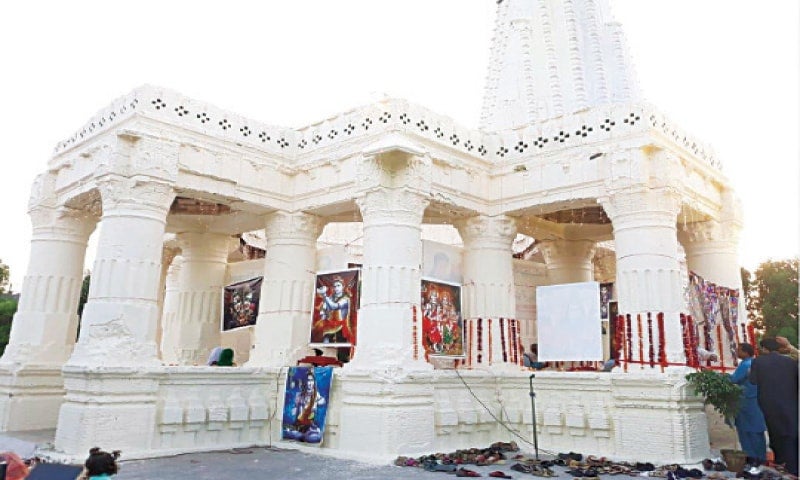Summary
Questions pertaining to whether the constitutional rights afforded to non-Muslim communities violate Islamic norms and principles are a murky and contested area of political and legal debate in Pakistan. These tensions were played out in the recent debates regarding the construction of the Shri Krishna temple in Islamabad where objections to the temple are grounded on Islam rather than the Constitution. The legal and political effects of being squeezed in between Islam and the Constitution for non-Muslim minorities place them in a perilous, ambiguous and vulnerable position.
Negotiating a place for non-Muslims in Pakistan presents fundamental political challenges. Although non-Muslims have a constitutional place in the country, both as citizens as well as recognised minorities, there are numerous tensions which seek to police their religious beliefs and practices, sidelining their presence in the constitutional narrative. This is done at first glance through a rigorous and comprehensive privileging of Islam in the Constitution. Islam not only assumes primacy in place above other religious traditions in the directive principles of the state, but also features as the state religion of the republic and in the constitutional account of the purpose of the state.
A major source of contestation in the Constitution is that the constitutional text veers clear of providing a precise definition of Islam. While this avoids a preferential treatment of any particular Islamic sect or school, it also means that who speaks for Islam is also unclear. And Islamic parties in the country often step in to fill this gap – if not this crisis of authority. If the Constitution is in the service of Islam – the edges between Islam and the Constitution are furthermore opaque and blurry. Questions pertaining to whether the constitutional rights afforded to non-Muslim communities violate Islamic norms and principles are a murky and contested area of political and legal debate.
These tensions played out in the recent debates regarding the construction of the Shri Krishna temple in Islamabad – the country’s capital. Hindus form the largest non-Muslim religious minority community in Pakistan but at last count in 1998, Hindus in Pakistan comprised about 1.6 per cent of the population. Present day numbers are assumed to be much lower. While more than 3,000 Hindu families reside in Islamabad, no adequate facility for worship and burial rites exist for them in the city. In 2017, a plot for Islamabad’s first Hindu temple was allotted by Nawaz Sharif after consultations took place with the Ministry of Religious Affairs, Special Branch and the Islamabad administration. However, the project experienced numerous delays and setbacks. The initiative was marked as a symbolic gesture of Pakistan’s tolerance towards the minorities. In 2020, Prime Minister Imran Khan went further, announcing not only £500,000 (S$900,561) to help fund the project, but also promising to restore some 400 Hindu temples across the country as part of his plan to showcase the heritage of the minorities.
Despite government approvals, construction came to a grinding halt. In spite of being in Khan’s coalition, the Pakistan Muslim League – Quaid (PML-Q) argued that the construction of the temple complex was “against the spirit of Islam”. The Jamia Ashrafia, a Lahore-based Islamic institution, issued a legal edict (fatwa) declaring that while it is permissible for the government to fund the upkeep and repair of existing houses of worship of the minority communities in Pakistan, the building of new places of worship for non-Muslims were strictly impermissible. A number of other Muslim clerics threatened the government with severe action if the construction were to go ahead. The Ulema Mashaikh Federation of Pakistan demanded that the government reverse its decision and Maulana Amir Zaman, a member of the right-wing Islamist party the Jamiat-e Ulema Islam-Fazl, declared that “Islam does not permit the construction of a new place of worship by religious minorities in a Muslim country.”
The pressure forced the Khan government to divert the matter to the Council of Islamic Ideology (CII). Upon receiving a number of petitions against the construction, the Islamabad High Court did the same – it reserved its verdict until the CII announced its findings. In October 2020, the CII declared that no constitutional or Sharia restrictions applied to the construction of the Shri Krishna temple in Islamabad or to any other part of the country. In December 2020, the government approved the building of the temple some six months after construction had halted.
The legal and political effect of being squeezed in between Islam and the Constitution puts the non-Muslim minorities in a perilous, ambiguous and vulnerable position. Indeed, while Article 20 promises the freedom to profess religion and to manage religious institutions, the state often cannot be seen to firmly further enforce or protect the interests of the minorities without alarming the religious right. It is important also to note that religious objections to the Shri Krishna temple were grounded on Islam, and not the Constitution. Precisely which constitutional rights of the Muslims were infringed in the proposal to build the temple, moreover, did not form a basis of these arguments.
. . . . .
Dr Imran Ahmed is an Honorary Associate at the University of New England, New South Wales, Australia, and a consultant with the Institute of South Asian Studies (ISAS), an autonomous research institute at the National University of Singapore (NUS). He can be contacted at iahmed5@une.edu.au. The author bears full responsibility for the facts cited and opinions expressed in this paper.
Photo credit: Wikipedia
-
 More From :
More From :
-
 Tags :
Tags :
-
 Download PDF
Download PDF



